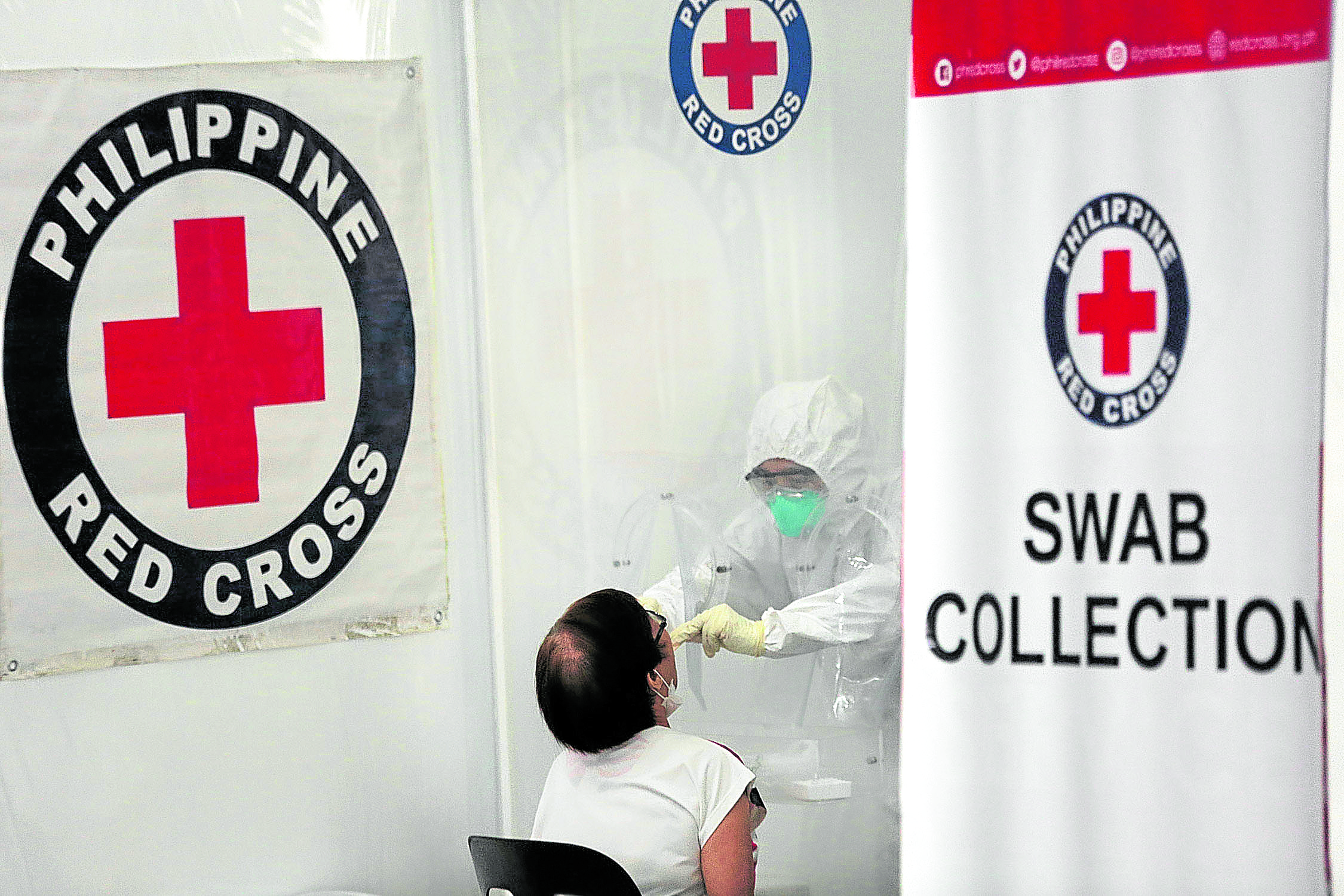
CUTTING COSTS. A Red Cross worker takes a swab sample of a patient at the Philippine Red Cross laboratory in Mandaluyong City in April. —INQUIRER PHOTO
MANILA, Philippines — A group of experts monitoring the COVID-19 situation in the country has urged the government to resolve the impasse between the Philippine Health Insurance Corp. (PhilHealth) and the Philippine Red Cross (PRC), as its data showed that the PRC’s pausing of its testing operations resulted in a reduction of reported coronavirus cases in Metro Manila and nearby provinces by around half.
According to the monitoring report of the OCTA Research dated October 26 and released to the media on Tuesday, the halt in PhilHealth-funded COVID-19 testing from PRC led to a decrease in reported cases by 40 to 50 percent in the following areas:
- Metro Manila: Quezon City, Manila, Pasig, Makati, Taguig, Pasay, Paranaque, Mandaluyong, Muntinlupa, San Juan and Pateros
- Rizal: Antipolo, Cainta, Taytay
- Cavite: Imus, Dasmariñas, General Trias, Bacoor
- Batangas: Batangas City
- Laguna: Calamba
“The national government is strongly urged to resolve the impasse between the PhilHealth and the Philippine Red Cross and to get PRC testing again,” said the research group, an independent interdisciplinary research group composed primarily of faculty members and alumni from the University of the Philippines, and includes contributors from the University of Santo Tomas and Providence College in the United States.
“Without the testing facilities provided by the PRC, our isolation, quarantine, and contact tracing programs are crippled because the LGUs do not know whether or not a person is infected with COVID-19 within the 24-48 hour time period required,” it added.
On October 14, PRC announced it has ceased conducting COVID-19 tests chargeable to PhilHealth due to the state insurer’s inability to settle its “ever-increasing outstanding balance” currently standing at over P930 million. The state insurer later vowed it will settle its debt.
PRC accounts for a quarter of the country’s total output for COVID-19 polymerase chain reaction testing, according to OCTA Research. It added that so far, PRC has conducted a total of 1.1 million swab tests, and provides an estimated 16,000 tests per day.
In NCR alone, PRC testing accounts for around 38 percent of all tests that have been conducted. If its tests are included in the daily tally, the average daily new cases in Metro Manila from October 11 will increase by 200 to 300, according to the research team.
OCTA Research even noted that the numbers presented in its report are significantly lower and may not provide an accurate picture of the state of pandemic in the country for the period of October 11 to 25 due to the pullout of Red Cross testing.
It likewise pointed out that public health authorities and pandemic management teams “are made blind because of less accurate information” without the RT-PCR testing facilities provided by the PRC.
“Accurate testing information and increased testing capacity are crucial to managing the pandemic. It [is] against this backdrop, that the government [should] ensure that the PRC resume testing as soon as possible,” the group said.
OCTA Research further noted that another reason to urgently resolve the impasse between PhilHealth and PRC is the provision of accessible and reliable COVID-19 testing for medical frontliners and incoming overseas Filipino workers (OFWs).
It said one of the “crippling effects” of the halt in PRC testing is that thousands of OFWs are now stranded in quarantine facilities still awaiting their tests. The group said test results have all been delayed because of the situation between PhilHealth and PRC.

